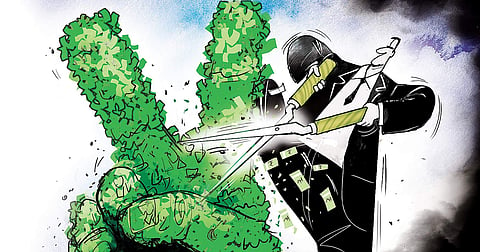

Although India is the largest democracy in the world and has over 815 million individuals on its electoral rolls, it is way behind other democracies when it comes to regulation of political parties and transparency in the funding of political parties and election spending. As a result, while one can see democracy at work from the village to the national level, one can also see the vulgar impact that dirty money is having on the working of political parties and on the electoral system. Some years ago, the Association for Democratic Reforms (ADR) had estimated that 70 per cent of the funds flowing into political parties came via cash donations from unknown sources.
Further, notwithstanding the frugal limits set by the Election Commission on election spending, candidates in the Lok Sabha and Assembly elections are known to routinely flout these directions. Until 1974, the limit set by the Election Commission for campaign spending in a Lok Sabha constituency in the big states was Rs 1.5 lakh. However, we were told that all serious contenders in the fray spent around Rs 20 lakh. Later, this limit was enhanced to Rs 4.5 lakh. Currently, the legal limit for election spending in a Lok Sabha constituency in the larger states is a fairly reasonable Rs 70 lakh—more than what an “average” aspirant can muster to give a good fight—but successful MPs tell us that their election cost them Rs 5 to Rs 10 crore! In other words, electoral spending is now beyond the reach of ordinary citizens. Needless to say that unless politics is funded by clean money and political parties, in turn, pick up “clean” candidates and provide them financial support, the system will remain hostage to the most corrupt elements in society.
The absence of transparency and accountability in the working and funding of political parties has been commented upon by the judiciary and various institutions over the years, but no one at the top has pondered over these issues and suggested corrective measures. Prime Minister Narendra Modi has been pressing for electoral reforms to bring down election spending. He has suggested that we restore the system of simultaneous elections to the Lok Sabha and the Assemblies. Another small but important step taken by his government in this regard is the introduction of electoral bonds to fund political parties.
The electoral bond scheme may not be the panacea for all ills dogging the political system, but it’s a beginning. The government has also taken a few more steps to cleanse political funding. It has banned cash donations of over Rs 2,000 to political parties (the earlier limit was Rs 20,000; it was the source of huge inflow of black money into political parties) and also amended the law to ensure that companies are not required to disclose the names of the parties to which they donate.
Explaining the scheme of electoral bonds, Finance Minister Arun Jaitley said that “as against a total non-transparency in the present system of cash donations where the donor, the donee, the quantum of donations and the nature of expenditure are all undisclosed, some element of transparency would be introduced” in as much as all donors declare the amount of bonds they purchased and all parties declare the quantum of bonds they received. However, how much each donor has given to a political party would be known only to the donor.
Defending this amount of secrecy that is built into this scheme, Jaitley says this is necessary because once this disclosure is made, past experience has shown that donors do not find the scheme attractive. It is a substantial advance on the present system of cash donations which involves “total unclean money”, he says. The minister has also promised that the government will consider further steps to cleanse political funding in the country.
Political parties in India were a law unto themselves for many decades. They did not maintain accounts. Nor did they file Income Tax Returns. The complete absence of accountability and transparency went on until the judiciary stepped in to clean the Augean stables. The first major initiative came from the Supreme Court when it directed the Election Commission to ensure that all candidates to legislative Assemblies and Parliament filed affidavits providing information on their educational qualifications, pending criminal cases and their assets and liabilities. Similarly, court pressure forced parties to maintain audited accounts, file their tax returns and keep the commission informed of their assets and liabilities.
The Supreme Court was shocked to note that the government was not enforcing Income Tax laws in respect of political parties (Common Cause A Registered Society vs Union of India and Others, 1996). In this case the court directed the Election Commission and the tax authorities to proceed against defaulting political parties, which had failed to file their tax returns.
Those who see the numbers feel a sense of pride in India’s democracy. The number of electors has ballooned from 173 million in 1951 to 815 million in 2014. Thanks to judicial interventions and pronouncements and firm handling by the Election Commission, electors know a lot more about the profile of every candidate from education and profession to their criminal records and their net worth. The commission has also done a spectacular job in introducing one standard Electronic Voting Machine (EVM) across the country; added the Voter Verifiable Paper Audit Trail to silence the critics of EVMs; and has been closely monitoring elections via observers.
Yet, much of our election campaigns are driven by unaccounted money. This deficiency must be addressed because quantity is not everything. Quality matters. We must move towards becoming not just the biggest but the best democracy in the world.
A Surya Prakash
Chairman, Prasar Bharati
Email: suryamedia@gmail.com